- Home
- Joseph Conrad
Secret Agent Page 5
Secret Agent Read online
Page 5
“Lombroso is an ass.”
Comrade Ossipon met the shock of this blasphemy by an awful, vacant stare. And the other, his extinguished eyes without gleams blackening the deep shadows under the great, bony forehead, mumbled, catching the tip of his tongue between his lips at every second word as though he were chewing it angrily:
“Did you ever see such an idiot? For him the criminal is the prisoner. Simple, is it not? What about those who shut him up there—forced him in there? Exactly. Forced him in there. And what is crime? Does he know that, this imbecile who has made his way in this world of gorged fools by looking at the ears and teeth of a lot of poor, luckless devils? Teeth and ears mark the criminal? Do they? And what about the law that marks him still better—the pretty branding instrument invented by the overfed to protect themselves against the hungry? Red-hot applications on their vile skins—hey? Can’t you smell and hear from here the thick hide of the people burn and sizzle? That’s how criminals are made for your Lombrosos to write their silly stuff about.”
The knob of his stick and his legs shook together with passion, whilst the trunk, draped in the wings of the havelock, preserved his historic attitude of defiance. He seemed to sniff the tainted air of social cruelty, to strain his ear for its atrocious sounds. There was an extraordinary force of suggestion in this posturing. The all but moribund veteran of dynamite wars had been a great actor in his time—actor on platforms, in secret assemblies, in private interviews. The famous terrorist had never in his life raised personally as much as his little finger against the social edifice. He was no man of action; he was not even an orator of torrential eloquence, sweeping the masses along in the rushing noise and foam of a great enthusiasm. With a more subtle intention, he took the part of an insolent and venomous evoker of sinister impulses which lurk in the blind envy and exasperated vanity of ignorance, in the suffering and misery of poverty, in all the hopeful and noble illusions of righteous anger, pity, and revolt. The shadow of his evil gift clung to him yet like the smell of a deadly drug in an old vial of poison, emptied now, useless, ready to be thrown away upon the rubbish-heap of things that had served their time.
Michaelis, the ticket-of-leave apostle, smiled vaguely with his glued lips; his pasty moon face drooped under the weight of melancholy assent. He had been a prisoner himself. His own skin had sizzled under the red-hot brand, he murmured softly. But Comrade Ossipon, nicknamed the Doctor, had got over the shock by that time.
“You don’t understand,” he began, disdainfully, but stopped short, intimidated by the dead blackness of the cavernous eyes in the face turned slowly towards him with a blind stare, as if guided only by the sound. He gave the discussion up, with a slight shrug of the shoulders.
Stevie, accustomed to move about disregarded, had got up from the kitchen table, carrying off his drawing to bed with him. He had reached the parlour door in time to receive in full the shock of Karl Yundt’s eloquent imagery. The sheet of paper covered with circles dropped out of his fingers, and he remained staring at the old terrorist, as if rooted suddenly to the spot by his morbid horror and dread of physical pain. Stevie knew very well that hot iron applied to one’s skin hurt very much. His scared eyes blazed with indignation: it would hurt terribly. His mouth dropped open.
Michaelis by staring unwinkingly at the fire had regained that sentiment of isolation necessary for the continuity of his thought. His optimism had begun to flow from his lips. He saw Capitalism doomed in its cradle, born with the poison of the principle of competition in its system. The great capitalists devouring the little capitalists, concentrating the power and the tools of production in great masses, perfecting industrial processes, and in the madness of self-aggrandizement only preparing, organizing, enriching, making ready the lawful inheritance of the suffering proletariat. Michaelis pronounced the great word “Patience”—and his clear blue glance, raised to the low ceiling of Mr. Verloc’s parlour, had a character of seraphic trustfulness. In the doorway Stevie, calmed, seemed sunk in hebetude.
Comrade Ossipon’s face twitched with exasperation.
“Then it’s no use doing anything—no use whatever.”
“I don’t say that,” protested Michaelis, gently. His vision of truth had grown so intense that the sound of a strange voice failed to rout it this time. He continued to look down at the red coals. Preparation for the future was necessary, and he was willing to admit that the great change would perhaps come in the upheaval of a revolution. But he argued that revolutionary propaganda was a delicate work of high conscience. It was the education of the masters of the world. It should be as careful as the education given to kings. He would have it advance its tenets cautiously, even timidly, in our ignorance of the effect that may be produced by any given economic change upon the happiness, the morals, the intellect, the history of mankind. For history is made with tools, not with ideas; and everything is changed by economic conditions—art, philosophy, love, virtue—truth itself!
The coals in the grate settled down with a slight crash; and Michaelis, the hermit of visions in the desert of a penitentiary, got up impetuously. Round like a distended balloon, he opened his short, thick arms, as if in a pathetically hopeless attempt to embrace and hug to his breast a self-regenerated universe. He gasped with ardour.
“The future is as certain as the past—slavery, feudalism, individualism, collectivism. This is the statement of a law, not an empty prophecy.”
The disdainful pout of Comrade Ossipon’s thick lips accentuated the negro type of his face.
“Nonsense,” he said, calmly enough. “There is no law and no certainty. The teaching propaganda be hanged. What the people knows does not matter, were its knowledge ever so accurate. The only thing that matters to us is the emotional state of the masses. Without emotion there is no action.”
He paused, then added with modest firmness:
“I am speaking now to you scientifically—scientifically—— Eh? What did you say, Verloc?”
“Nothing,” growled from the sofa Mr. Verloc, who, provoked by the abhorrent sound, had merely muttered a “Damn.”
The venomous spluttering of the old terrorist without teeth was heard.
“Do you know how I would call the nature of the present economic conditions? I would call it cannibalistic. That’s what it is! They are nourishing their greed on the quivering flesh and the warm blood of the people—nothing else.”
Stevie swallowed the terrifying statement with an audible gulp, and at once, as though it had been swift poison, sank limply in a sitting posture on the steps of the kitchen door.
Michaelis gave no signs of having heard anything. His lips seemed glued together for good; not a quiver passed over his heavy cheeks. With troubled eyes he looked for his round, hard hat, and put it on his round head. His round and obese body seemed to float low between the chairs under the sharp elbow of Karl Yundt. The old terrorist, raising an uncertain and clawlike hand, gave a swaggering tilt to a black felt sombrero shading the hollows and ridges of his wasted face. He got in motion slowly, striking the floor with his stick at every step. It was rather an affair to get him out of the house because, now and then, he would stop, as if to think, and did not offer to move again till impelled forward by Michaelis. The gentle apostle grasped his arm with brotherly care; and behind them, his hands in his pockets, the robust Ossipon yawned vaguely. A blue cap with a patent leather peak set well at the back of his yellow bush of hair gave him the aspect of a Norwegian sailor bored with the world after a thundering spree. Mr. Verloc saw his guests off the premises, attending them bareheaded, his heavy overcoat hanging open, his eyes on the ground.
He closed the door behind their backs with restrained violence, turned the key, shot the bolt. He was not satisfied with his friends. In the light of Mr. Vladimir’s philosophy of bomb throwing they appeared hopelessly futile. The part of Mr. Verloc in revolutionary politics having been to observe, he could not all at once, either in his own home or in larger assemblies, take the initiative of
action. He had to be cautious. Moved by the just indignation of a man well over forty, menaced in what is dearest to him—his repose and his security—he asked himself scornfully what else could have been expected from such a lot, this Karl Yundt, this Michaelis—this Ossipon.
Pausing in his intention to turn off the gas burning in the middle of the shop, Mr. Verloc descended into the abyss of moral reflections. With the insight of a kindred temperament he pronounced his verdict. A lazy lot—this Karl Yundt, nursed by a blear-eyed old woman, a woman he had years ago enticed away from a friend, and afterwards had tried more than once to shake off into the gutter. Jolly lucky for Yundt that she had persisted in coming up time after time, or else there would have been no one now to help him out of the ’bus by the Green Park railings, where that spectre took its constitutional crawl every fine morning. When that indomitable snarling old witch died the swaggering spectre would have to vanish, too—there would be an end to fiery Karl Yundt. And Mr. Verloc’s morality was offended also by the optimism of Michaelis, annexed by his wealthy old lady, who had taken lately to sending him to a cottage she had in the country. The ex-prisoner could moon about the shady lanes for days together in a delicious and humanitarian idleness. As to Ossipon, that beggar was sure to want for nothing as long as there were silly girls with savings-bank books in the world. And Mr. Verloc, temperamentally identical with his associates, drew fine distinctions in his mind on the strength of insignificant differences. He drew them with a certain complacency, because the instinct of conventional respectability was strong within him, being only overcome by his dislike of all kinds of recognized labour—a temperamental defect which he shared with a large proportion of revolutionary reformers of a given social state. For obviously one does not revolt against the advantages and opportunities of that state, but against the price which must be paid for the same in the coin of accepted morality, self-restraint, and toil. The majority of revolutionists are the enemies of discipline and fatigue mostly. There are natures, too, to whose sense of justice the price exacted looms up monstrously enormous, odious, oppressive, worrying, humiliating, extortionate, intolerable. Those are the fanatics. The remaining portion of social rebels is accounted for by vanity, the mother of all noble and vile illusions, the companion of poets, reformers, charlatans, prophets, and incendiaries.
Lost for a whole minute in the abyss of meditation, Mr. Verloc did not reach the depth of these abstract considerations. Perhaps he was not able. In any case he had not the time. He was pulled up painfully by the sudden recollection of Mr. Vladimir, another of his associates, whom in virtue of subtle moral affinities he was capable of judging correctly. He considered him as dangerous. A shade of envy crept into his thoughts. Loafing was all very well for these fellows, who knew not Mr. Vladimir, and had women to fall back upon; whereas he had a woman to provide for——
At this point, by a simple association of ideas, Mr. Verloc was brought face to face with the necessity of going to bed some time or other that evening. Then why not go now—at once? He sighed. The necessity was not so normally pleasurable as it ought to have been for a man of his age and temperament. He dreaded the demon of sleeplessness, which he felt had marked him for its own. He raised his arm, and turned off the flaring gas-jets above his head.
A bright band of light fell through the parlour door into the part of the shop behind the counter. It enabled Mr. Verloc to ascertain at a glance the number of silver coins in the till. These were but few; and for the first time since he opened his shop he took a commercial survey of its value. This survey was unfavourable. He had gone into trade for no commercial reasons. He had been guided in the selection of this peculiar line of business by an instinctive leaning towards shady transactions, where money is picked up easily. Moreover, it did not take him out of his own sphere—the sphere which is watched by the police. On the contrary, it gave him a publicly confessed standing in that sphere, and as Mr. Verloc had unconfessed relations which made him familiar with yet careless of the police, there was a distinct advantage in such a situation. But as a means of livelihood it was by itself insufficient.
He took the cash-box out of the drawer, and turning to leave the shop, became aware that Stevie was still downstairs.
What on earth is he doing there? Mr. Verloc asked himself. What’s the meaning of these antics? He looked dubiously at his brother-in-law, but he did not ask him for information. Mr. Verloc’s intercourse with Stevie was limited to the casual mutter of a morning, after breakfast, “My boots,” and even that was more a communication at large of a need than a direct order or request. Mr. Verloc perceived with some surprise that he did not know really what to say to Stevie. He stood still in the middle of the parlour, and looked into the kitchen in silence. Nor yet did he know what would happen if he did say anything. And this appeared very queer to Mr. Verloc in view of the fact, borne upon him suddenly, that he had to provide for this fellow, too. He had never given a moment’s thought till then to that aspect of Stevie’s existence.
Positively he did not know how to speak to the lad. He watched him gesticulating and murmuring in the kitchen. Stevie prowled round the table like an excited animal in a cage. A tentative “Hadn’t you better go to bed now?” produced no effect whatever; and Mr. Verloc, abandoning the stony contemplation of his brother-in-law’s behaviour, crossed the parlour wearily, cash-box in hand. The cause of the general lassitude he felt while climbing the stairs being purely mental, he became alarmed by its inexplicable character. He hoped he was not sickening for anything. He stopped on the dark landing to examine his sensations. But a slight and continuous sound of snoring pervading the obscurity interfered with their clearness. The sound came from his mother-in-law’s room. Another one to provide for, he thought—and on this thought walked into the bedroom.
Mrs. Verloc had fallen asleep with the lamp (no gas was laid upstairs) turned up full on the table by the side of the bed. The light thrown down by the shade fell dazzlingly on the white pillow sunk by the weight of her head reposing with closed eyes and dark hair done up in several plaits for the night. She woke up with the sound of her name in her ears, and saw her husband standing over her.
“Winnie! Winnie!”
At first she did not stir, lying very quiet and looking at the cash-box in Mr. Verloc’s hand. But when she understood that her brother was “capering all over the place downstairs” she swung out in one sudden movement on to the edge of the bed. Her bare feet, as if poked through the bottom of an unadorned, sleeved calico sack buttoned tightly at neck and wrists, felt over the rug for the slippers while she looked upward into her husband’s face.
“I don’t know how to manage him,” Mr. Verloc explained, peevishly. “Won’t do to leave him downstairs alone with the lights.”
She said nothing, glided across the room swiftly, and the door closed upon her white form.
Mr. Verloc deposited the cash-box on the night table, and began the operation of undressing by flinging his overcoat on to a distant chair. His coat and waistcoat followed. He walked about the room in his stockinged feet, and his burly figure, with the hands worrying nervously at his throat, passed and repassed across the long strip of looking-glass in the door of his wife’s wardrobe. Then after slipping his braces off his shoulders he pulled up violently the venetian blind, and leaned his forehead against the cold window-pane—a fragile film of glass stretched between him and the enormity of cold, black, wet, muddy, inhospitable accumulation of bricks, slates, and stones, things in themselves unlovely and unfriendly to man.
Mr. Verloc felt the latent unfriendliness of all out of doors with a force approaching to positive bodily anguish. There is no occupation that fails a man more completely than that of a secret agent of police. It’s like your horse suddenly falling dead under you in the midst of an uninhabited and thirsty plain. The comparison occurred to Mr. Verloc because he had sat astride various army horses in his time, and had now the sensation of an incipient fall. The prospect was as black as the window-pane against w
hich he was leaning his forehead. And suddenly the face of Mr. Vladimir, clean-shaved and witty, appeared enhaloed in the glow of its rosy complexion like a sort of pink seal impressed on the fatal darkness.
This luminous and mutilated vision was so ghastly physically that Mr. Verloc started away from the window, letting down the venetian blind with a great rattle. Discomposed and speechless with the apprehension of more such visions, he beheld his wife re-enter the room and get into bed in a calm, businesslike manner which made him feel hopelessly lonely in the world. Mrs. Verloc expressed her surprise at seeing him up yet.
“I don’t feel very well,” he muttered, passing his hands over his moist brow.
“Giddiness?”
“Yes. Not at all well.”
Mrs. Verloc, with all the placidity of an experienced wife, expressed a confident opinion as to the cause, and suggested the usual remedies; but her husband, rooted in the middle of the room, shook his lowered head sadly.
“You’ll catch cold standing there,” she observed.
Mr. Verloc made an effort, finished undressing, and got into bed. Down below in the quiet, narrow street measured footsteps approached the house, then died away, unhurried and firm, as if the passer-by had started to pace out all eternity, from gas-lamp to gas-lamp in a night without end; and the drowsy ticking of the old clock on the landing became distinctly audible in the bedroom.
Mrs. Verloc, on her back, and staring at the ceiling, made a remark.
“Takings very small to-day.”

 Heart of Darkness
Heart of Darkness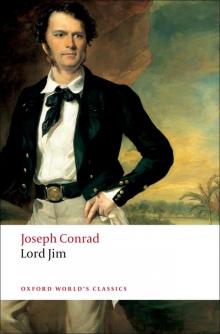 Lord Jim
Lord Jim The Nigger of the Narcissus (Echo Library)
The Nigger of the Narcissus (Echo Library) Victory (Dover Thrift Editions)
Victory (Dover Thrift Editions) Secret Agent
Secret Agent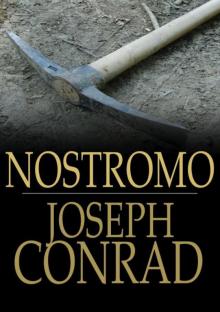 Nostromo
Nostromo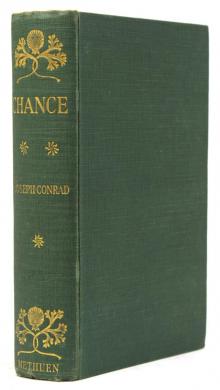 Chance: A Tale in Two Parts
Chance: A Tale in Two Parts Youth
Youth Almayer's Folly
Almayer's Folly The Heart of Darkness and the Secret Sharer
The Heart of Darkness and the Secret Sharer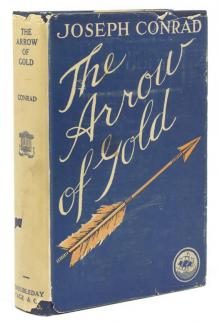 The Arrow of Gold: A Story Between Two Notes
The Arrow of Gold: A Story Between Two Notes The Rescue: A Romance of the Shallows
The Rescue: A Romance of the Shallows The Point Of Honor: A Military Tale
The Point Of Honor: A Military Tale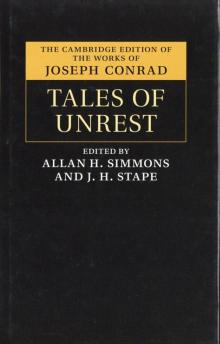 Tales of Unrest
Tales of Unrest Under Western Eyes
Under Western Eyes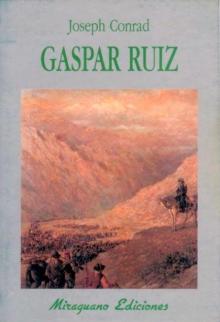 Gaspar Ruiz
Gaspar Ruiz A Set of Six
A Set of Six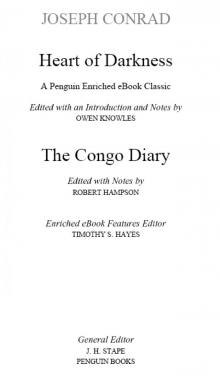 Heart of Darkness and the Congo Diary (Penguin Classics)
Heart of Darkness and the Congo Diary (Penguin Classics) Heart of Darkness and Selected Short Fiction
Heart of Darkness and Selected Short Fiction Typhoon
Typhoon Youth, a Narrative
Youth, a Narrative Tomorrow
Tomorrow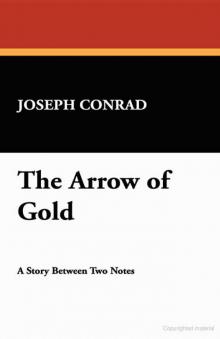 The Arrow of Gold
The Arrow of Gold The Shadow Line: A Confession
The Shadow Line: A Confession The Rescue
The Rescue Victory (Echo Library)
Victory (Echo Library) The Brute
The Brute Romance
Romance A Personal Record
A Personal Record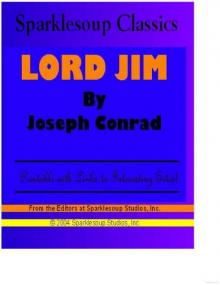 Lord Jim: A Tale
Lord Jim: A Tale Heart of Darkness and Selected Short Fiction (Barnes & Noble Classics Series)
Heart of Darkness and Selected Short Fiction (Barnes & Noble Classics Series) Within the Tides
Within the Tides The Secret Sharer and Other Stories
The Secret Sharer and Other Stories Falk
Falk Heart of Darkness and The Secret Sharer
Heart of Darkness and The Secret Sharer Chance
Chance An Anarchist
An Anarchist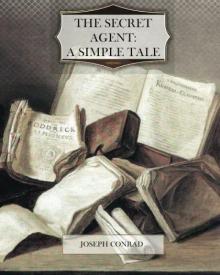 The Secret Agent: A Simple Tale
The Secret Agent: A Simple Tale The Secret Agent
The Secret Agent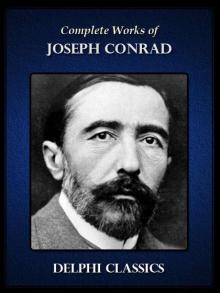 Complete Works of Joseph Conrad (Illustrated)
Complete Works of Joseph Conrad (Illustrated)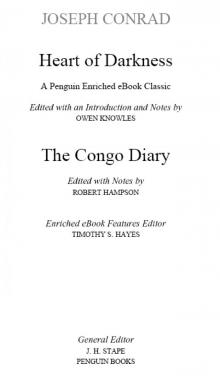 Heart of Darkness and the Congo Diary
Heart of Darkness and the Congo Diary Notes on Life & Letters
Notes on Life & Letters Typhoon (Single Story)
Typhoon (Single Story)